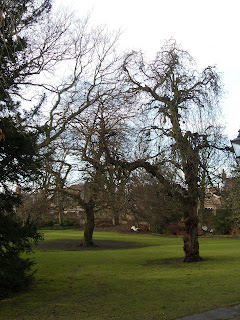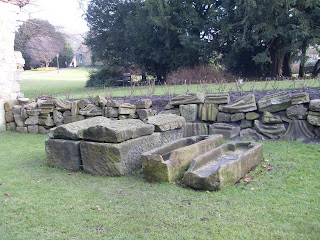Society is all but rude,
To this delicious solitude.
To this delicious solitude.
- The Garden, Andrew Marvell
When you walk through the garden
you gotta watch your back
well I beg your pardon
walk the straight and narrow track
you gotta watch your back
well I beg your pardon
walk the straight and narrow track
- Way down in the hole, Tom Waits
Today started with a seminar in England in Europe, a module examining the relationship between Anglo-Saxon and Continental literature from the 10th century up to and including the 12th. This was followed by a session of reading about manuscripts from 14th-century England and onwards for my second module, Fictions of Audacity which revolves around Middle English romances. It should therefore not be a surprise that I found it necessary to take a break after these labourings and I decided to take a walk in the museum garden which lies within close proximity of King's Manor. The air was mild and moist and the sun was shining very pleasantly, so from the greensward and wet stones there exuded a vernal fragrance lightening my spirits in its unique way and it turned out to be a fine day for sauntering the garden.
Although he seems watchful and alert he was in fact merely curious about the noises I made.
To tell the beawtie of my buildings fayre,
Adornd with purest golde, and precious stone;
To tell my riches, and endowments rare
That by my foes are now all spent and gone:
To tell my forces matchable to none,
Were but lost labour, that few would beleeue,
And with rehearsing would me more agreeue.
- The Ruines of Time, Edmund Spenser
Adornd with purest golde, and precious stone;
To tell my riches, and endowments rare
That by my foes are now all spent and gone:
To tell my forces matchable to none,
Were but lost labour, that few would beleeue,
And with rehearsing would me more agreeue.
- The Ruines of Time, Edmund Spenser
Death, which fastens us to the earth, remains pastoral or brutish, because no single corpse contributes to some tiered concept of a past.
- What the Twilight Says, Derek Walcott
I in their delicate fellowship was one
- The Hound of Heaven, Francis Thompson
Meanwhile the mind, from pleasure less,
Withdraws into its happiness:
The mind, that ocean where each kind
Does straight its own resemblance find;
Yet it creates, transcending these,
Far other worlds, and other seas;
Annihilating all that's made
To a green thought in a green shade.
Withdraws into its happiness:
The mind, that ocean where each kind
Does straight its own resemblance find;
Yet it creates, transcending these,
Far other worlds, and other seas;
Annihilating all that's made
To a green thought in a green shade.
- The Garden, Andrew Marvell
The Ouse had recently flooded its banks and covered them with silt. It is not void of aesthetic value, but it is difficult to get off your shoes.
This is Mrs. Blackbird showing courage while her husband hides in the bushes.
And here he is.
While our sports shall be seen
On the Echoing Green.
On the Echoing Green.
- The Echoing Green, William Blake

















I will definately drop by that garden when I someday visit York, and I'll bring something for the squirrels, perhaps.
SvarSlettI strongly recommend both those ideas. Today I tried to give them bread, but - being spoiled - they didn't want it so I gave it to the fowls instead, which was a somewhat unpleasant experience.
SvarSlettHaha, there's something Lovecraftian about your language from time to time. I'll lend you a short story anthology when you're back, so you can see for yourself.
SvarSlettAnyway, the Gardens seem as beautiful as they were two years ago. In spite of the silt.
And if you should happen to come across any references to Ancient or Late Ancient antecedents to Medieval literary tropes, send them my way, would you? Or anything else of interest, for that matter.
Hehe, I take that as a compliment. I've never read anything by him, so I'm quite curious to see how our styles resemble. This may be caused by stylistic inconsistencies on my part, of course, in the sense that I have yet to find a style.
SvarSlettIn "England in Europe" we read Apollonius of Tyre, which appears to have been quite formative for medieval romance and might be right up your alley. I will of course notify you of other antecedents as well.